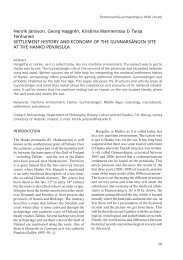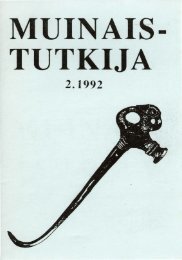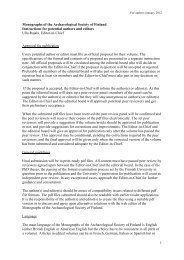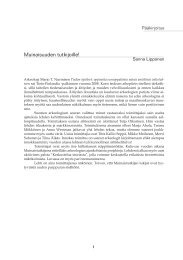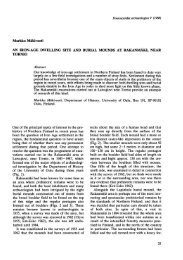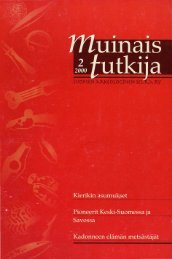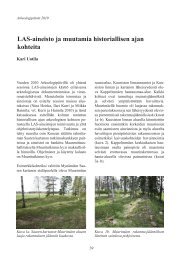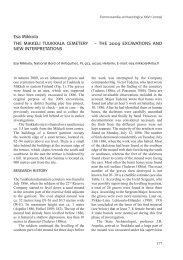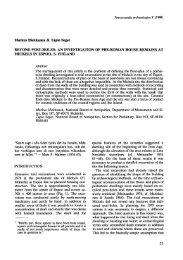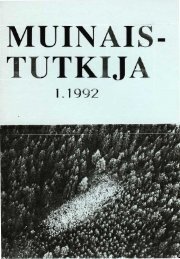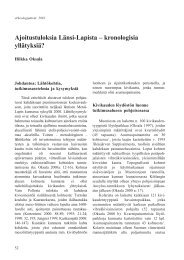ANNE WIKKULA - Suomen arkeologinen seura ry.
ANNE WIKKULA - Suomen arkeologinen seura ry.
ANNE WIKKULA - Suomen arkeologinen seura ry.
You also want an ePaper? Increase the reach of your titles
YUMPU automatically turns print PDFs into web optimized ePapers that Google loves.
Finland to the outlying northeastern region of<br />
Kuusamo. Her most important projects in the field<br />
were the excavations at the Stone Age site of<br />
Nastinristi in Laitila, various Stone Age sites in<br />
llomantsi, and field work at the prehistoric complex<br />
of the Rapola hillfort, which is Finland's largest<br />
ancient fortification structure. At the National<br />
Board of Antiquities she was also involved in<br />
projects for developing archaeological prospecting<br />
methods.<br />
Wikkula studied archaeology at a time when<br />
computers began to make their breakthrough in administration<br />
and research. She was soon drawn into<br />
"this wonderful world of computers", to quote her<br />
own words. She was one of the main experts engaged<br />
in developing the computerized site protection<br />
and research register of the National Board of<br />
Antiquities and she also participated in the work of<br />
an organization coordinating archaeological databases<br />
in Europe.<br />
In 1990 Anne Wikkula entered the employ of the<br />
Department of Archaeology of the University of<br />
Helsinki. As assistant, she was responsible for a<br />
great number administrative and teaching duties<br />
that took time from research. She was also Acting<br />
Professor in Archaeology in 1996. However, she<br />
was seriously involved in developing the department's<br />
projects, of which the most important was a<br />
multidisciplina<strong>ry</strong> study on the prehisto<strong>ry</strong> of the<br />
Lake Saimaa region (see Vikkula 1994 & 1996).<br />
The GIS method was of prime importance to this<br />
project. Further studies of this method, including<br />
an expedition and study trip to Australia, was a<br />
natural addition to Anne Wikkula' s computer interests<br />
and the tasks which had emerged when she was<br />
in the service of the National Board of Antiquities.<br />
Anne's personal area of interest was the Late<br />
Stone Age and especially the final period of the<br />
Comb Ware Culture, as clearly indicated by her<br />
publications. Her doctoral dissertation, which was<br />
to remain unfinished, was on the Pyheensilta phase,<br />
the last stage of the culture.<br />
In addition to her enthusiasm for computers,<br />
Anne Wikkula's publications point to a unique and<br />
open-minded interest in the methods of archaeology<br />
- from recent field techniques and equipment<br />
to etbnoarchaeological experiments. Her starting<br />
points in regard to methods and research in general<br />
were practical. Anne Wikkula was not inspired by<br />
far-ranging philosophical and symbolic explanations;<br />
an environmentally detenninistic position<br />
dominated her views of changes in the phenomena<br />
of settlement archaeology.<br />
Anne Wikkula took a responsible attitude to her<br />
choice of career, and her energy was always at the<br />
disposal of colleagues. She was secreta<strong>ry</strong> and<br />
chairperson of the Archaeological Society of Finland<br />
from 1984 to 1994. She took active steps to<br />
further the Society's publications not only by organizing<br />
matters but also by actively contributing<br />
to both the pages of this journal and other publications<br />
of the Society. The Finnish Society for Marine<br />
Archaeology also found in Anne an ardent supporter<br />
and developer of training in the field.<br />
Appointed and elected to various positions of<br />
trust, Anne Wikkula had to take a stand on a variety<br />
of issues. Her appended bibliography includes her<br />
written contributions to debate and exchanges of<br />
opinion in archaeology. They give a good idea of<br />
discussion in Finnish archaeology in the 1980s and<br />
'90s, and of concerns in administration, the development<br />
of teaching and instruction, innovations of<br />
method and a variety of passions that stirred archaeologists<br />
in Finland. Anne Wikkula boldly took<br />
a stand on debated issues. She did so regardless of<br />
the fact that this was by no means easy among Finland's<br />
few archaeologists. The lack of a critical<br />
mass ensured that only few people would find<br />
themselves on the same level in debate and discussion.<br />
Personal relations could also be a hinder to<br />
normal criticism. A book review could easily lead<br />
to an admonishing letter, heated remarks and expressions<br />
of opinion. Established truths and administratively<br />
dictated positions, and the resulting inability<br />
to engage in debate, annoyed and frustrated<br />
Anne. In 1994, after having sampled scholarly and<br />
scientific discussion along Australian and American<br />
lines, Anne Wikkula published a polemic article<br />
on undue sensitivity in which she even suspected<br />
that she had been born in the wrong count<strong>ry</strong>.<br />
All this no doubt depressed and fatigued Anne<br />
Wikkula. Her comprehensive and critical attitude<br />
to her own work and perhaps her enthusiasm for<br />
new methodological discoveries slowed her work<br />
on her dissertation. Though by no means the only<br />
ones, these reasons may explain to colleagues why<br />
Anne felt she could no longer go on. We are left<br />
with the jarring words on her Internet home page:<br />
"When I was still alive".<br />
Anne Wikkula's serious attitude to her own<br />
work, her contribution to research, academic teaching<br />
and administration particularly in the innovation<br />
and introduction of methods and the ideas<br />
which she shared in her teaching and projects constitute<br />
a life's work that is an abiding contribution<br />
to Finnish archaeology.<br />
J.-P. Taavitsainen<br />
University of Turku<br />
Department of Archaeology<br />
FIN-20014 Turun yliopisto<br />
Finland<br />
70



